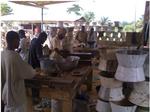Toyola Charcoal Stove: Improving the Environment and Health of the Poor in Ghana
Toyola Energy Limited is a company that operates in Ghana. It produces and distributes energy efficient charcoal stoves and solar lanterns for domestic users in the urban and rural parts of Ghana. Toyola entrepreneurs Suraj Wahab and Ernest Kyei – two artisans – have implemented an innovative business model that includes the poor along the whole value chain as suppliers, manufacturers, retailers and customers and accounts for positive economic, social and environmental effects.
The Toyola cook stove is fitted with a ceramic liner to improve fuel efficiency by 50% in comparison with the traditional coal pot. This technology is aimed at minimizing the rate of deforestation and carbon emissions. Users benefit from reduced indoor air pollution and from saving money. The efficient stove also creates employment – especially for the youth, Toyola has trained and created employment for over 300 artisans nationwide. Employment is generated along the whole value chain which comprises of scrap suppliers, stove manufacturers, distributors and retailers. Toyola encourages artisans to specialize in producing one of the 26 parts that make up the coal pot. Wahab and Kyei estimate that this increased specialization helps to increase the productivity of the artisans by about 6-fold. Toyola delivers stoves to rural dwellers, who largely depend on firewood and charcoal for their domestic cooking and also on kerosene for lighting. The Toyola products (stoves and lanterns) provide their users with cleaner, healthier and cheaper energy. Toyola often sells their products on credit to local market vendors who earn 10% commission from selling the product. Toyola sometimes also allows barter financing to give the most deprived access to their products. They do this because they believe that their most loyal ‘sales people’ are the users of the products.


